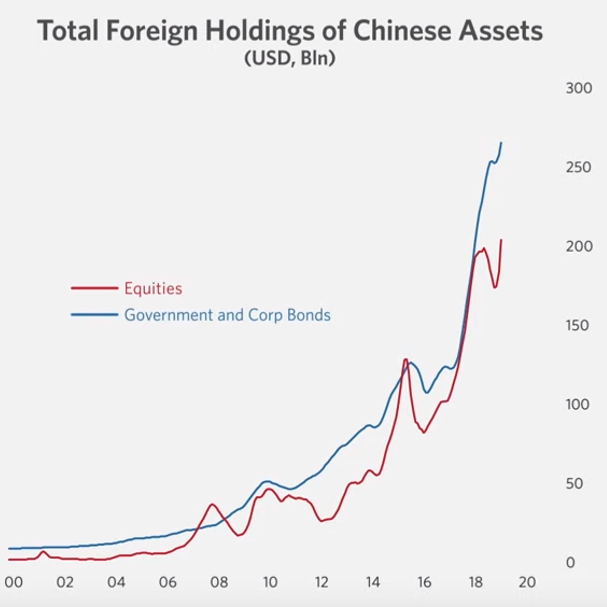Investing in a country “because it’ll be the next great empire” isn’t a thesis you hear every day.
It certainly makes for a welcome break from the normal reasons, like low inflation and unemployment, decent demographics, etc.
But hedge fund manager Ray Dalio recently made a bullish call on China, for just this reason:
“Would you not have wanted to invest with the Dutch and the Dutch empire? Would you have not wanted to have invested in the industrial revolution and the British Empire? Would you have not wanted to have invested in the United States and the United States Empire? I think [China is] comparable…”
Taking a look at the figures, he isn’t the only one. Investors have become increasingly keen on owning a slice of China’s Empire, in recent years though perhaps they haven’t recognised it as such:
 Source: Bridgewater Associates
Source: Bridgewater Associates
Wealthy Chinese meanwhile, have been taking the opposite view. They’re trying to sell their assets on the mainland, and get their money out of the country. This desire to sell Chinese assets, met by the desire of foreigners to buy them, has led to some wild results.
Late last year, a Chinese brick building company bought a sapphire weighing over 12 kilos with 25 million of its shares. The stone, worth $50 million, would not stay in China of course, but be taken on a “world tour”.
The firm was heavily indebted, but it subsequently raised $75 million dollars by issuing more shares… which it then spent on what was supposedly a painting by Michelangelo. The company was soon after delisted from the Nasdaq for failing to file its reports correctly.
Accounting standards in China can be somewhat different from those in the West. From Yicai Global, late last month:
China’s securities regulator has suspended 43 initial public offerings and refinancing cases being handled by the country’s second-largest accounting firm, including IPOs on the country’s new Nasdaq-style trading venue, as the company is probed for allegedly falsifying information.
Ruihua Certified Public Accountants, which audits almost a third of all listed companies in China, is implicated in a scandal involving chemical maker Kangde Xin Composite Material. The struggling firm is accused of inflating profits by CNY11.9 billion (USD1.7 billion) from January 2015 to last December…
Two empires and an asterisk
China is not the challenge we face: rather, the challenge is the new Chinese empire…
We have truly entered an American-Chinese bipolar struggle. But it is a bipolar struggle with an asterisk: the asterisk being Russia, which can always inflict consequential damage on the United States. Yet, whereas the Russians appear to our media as classic bad guys, the Chinese are more opaque and business-like, so the gravity of our competition with Beijing is still insufficiently appreciated by our media…
In functional and historical terms, this will be an imperial struggle, though our elites both inside and outside government will forbid use of the term. The Chinese will have an advantage in this type of competition as they have a greater tradition in empire building than we do, and they are not ashamed of it as we have become.
– “America Must Prepare for the Coming Chinese Empire” by Robert Kaplan, in The National Interest
The aforementioned Dalio, whose hedge fund Bridgewater is the largest in the world, recognises the clash between the US and China as a clash of empires. “If there’s no big war, I’m bullish on China, and if there’s a big war, I’m bearish on both the US and China”, saying that owning assets in both countries is a means of having “bets on both horses”.
As we mentioned earlier in the week, with China’s greater inclusion in MSCI global indexes for stocks and bonds, ever more money from foreign investors is set to flood into Chinese assets – until it isn’t. For capital deployed to China may well become collateral damage in Cold War II.
As the ante is upped, the US may well look to choke off foreign investment in the country to inflict economic pressure. And on the flipside the Chinese government may prevent any foreign capital from leaving to prevent such damage from occurring – imagine the Woodford debacle but using the figures described in the chart up top.
To imagine that two empires will clash and leave investors in both countries unscathed, is far too optimistic to my eyes, especially when the approach to capital in both countries is so different. Those who’d follow Ray Dalio in investing in China to harvest the glories of its empire should tread carefully.
That doesn’t mean there aren’t ways of profiting from the great power competition however: .
All the best,
Boaz Shoshan
Editor, Capital & Conflict
Category: Market updates


